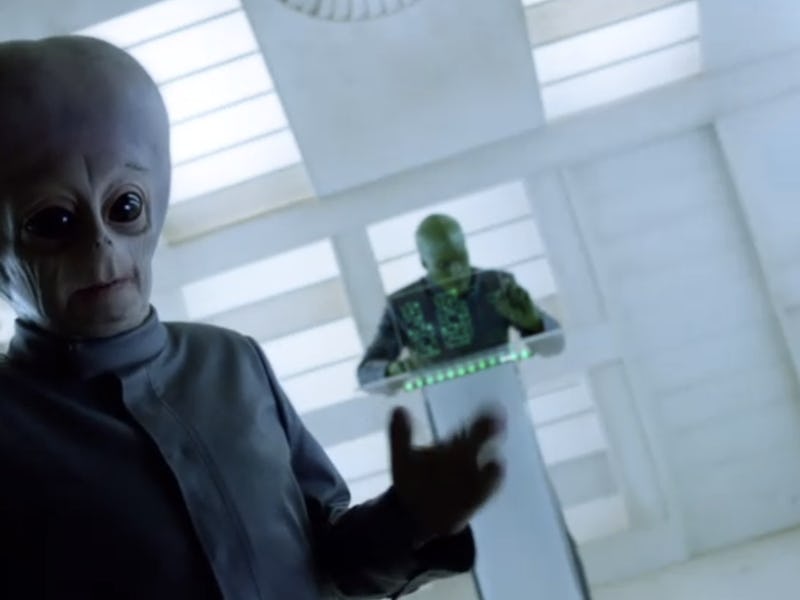What 'People of Earth' Teaches Us About Election Conspiracy Theorists
When people feel like they aren't heard, it's trouble for everyone.

In the season premiere of People of Earth, a new TBS comedy that follows members of an alien abduction support group, conspiracy theorizing is distilled into a science. As Ozzie (Wyatt Cenac), a journalist who recently drove into a deer in alien-ridden upstate New York, recounts his accident to an abductee named Gerry (Luka Jones), his innocuous anecdote is expertly and rapidly twisted into fuel for the conspiratorial fire. The fleeting scene is a complete snapshot of the mental machinations responsible for the conspiracies that have plagued America’s entire presidential campaign.
“You had your accident in Beacon. You hit a deer. And you’re dreaming about it?” Gerry asks.
“It’s not that unusual,” Ozzie says, skeptical.
“You’re right,” says Gerry, his eyes glowing. “It’s textbook.”
This brief interplay between Ozzie and Gerry tells you everything you need to know about conspiracy theorists onscreen and off: As cognitive psychologists have argued, they tend to believe multiple theories, they often feel undervalued and disenfranchised, and most of all, they’re constantly vying to regain a sense of control.
Gerry, for one thing, is seemingly well-versed in identifying deniers, suggesting that his brain’s conspiratorial pathways are well marked and even better traversed; by listing the most salient parts of Ozzie’s story, it’s clear Gerry has a prefabricated mental checklist. We learn, later, that the small community of StarCrossed alien “experiencers” — they deem “abductees” is too judgmental a term — that’s formed in Beacon are aware of and very defensive toward external ridicule, showing that they are used to feeling undervalued and having their views ignored. By immediately labeling Ozzie’s situation as “textbook,” Gerry asserts his expertise, underscoring his belief that he’s got a stronger grip on the world around him than the new friend he’s just made.
Whether conspiracy theorists think that Trump is a reptilian or that aliens walk among us, what they're really vying for is a sense of control.
While these characteristics are funny to point out in the context of a lighthearted sci-fi show, when they’re transposed onto real-life humans, they come across as concerning, or even just sad. The conspiracy theories that have arisen surrounding America’s presidential candidates this season — Is the Hillary we see on TV really a body double? Is Donald Trump actually a senior member of the Kremlin? — are symptomatic of the part of the nation that feels powerless against the reality they’re faced with. As the New York Times put it, “The current scientific thinking suggests these beliefs are nothing more than an extreme form of cynicism, a turning away from politics and traditional media — which only perpetuates the problem.”
During this past election season, it’s become clear that many of these conspiracy theorists are older, disenfranchised white people who feel, because of their struggles, like democracy has left them behind. Like the alien experiencers of StarCrossed, they’re passed the point of pushing back against majority ridicule, instead harnessing it as a galvanizing force. And just as the characters in People of Earth, they are not necessarily less intelligent than the rest of the population or lacking reasoning skills; what defines them is their rampant mistrust in the world around them and the (often justified) feeling that their voices are not being heard.
It’s only after the pivotal scene between Ozzie and Gerry that People of Earth becomes truly divorced from reality. Ozzie’s openness to the ideas presented in StarCrossed, which involve him not only taking the time to listen to the experiencers but making them feel heard, is simply not a scenario that would play out in real life — at least, it would not play out in a way that would ever help nip the birth of these conspiracies in the bud. As this election has made clear, Trump has applied a perverted version of Ozzie’s approach to his campaign, pandering to the misguided beliefs of conspiracy theorists for his own gains. Doing so, unfortunately, will only cause feelings of disenfranchisement to snowball in the long run. A wiser and more constructive approach would be to make like Ozzie and actually hear them out, which will hopefully restore the sense of control and meaning that they think they’ve lost in the first place.